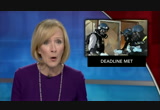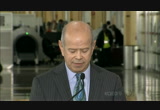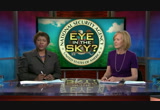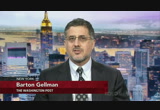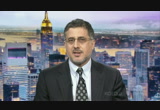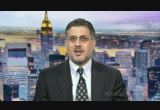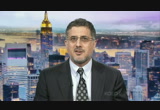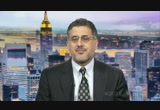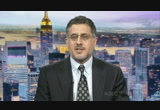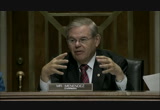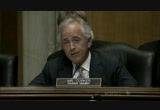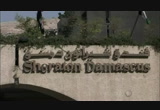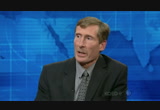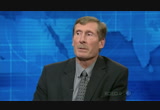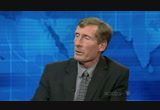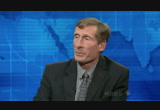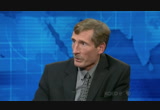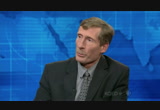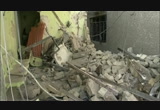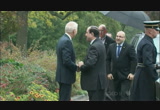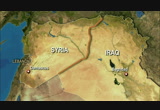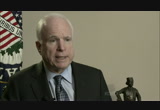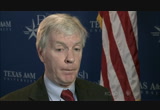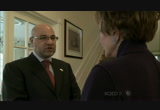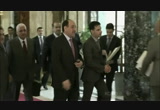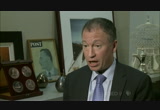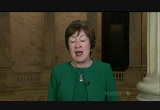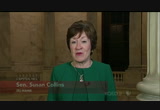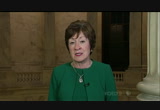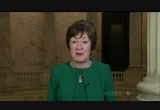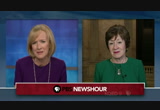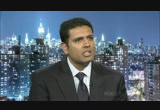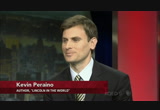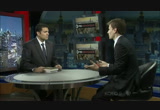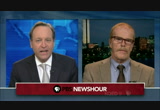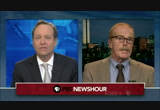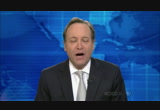tv PBS News Hour PBS October 31, 2013 3:00pm-4:01pm PDT
3:00 pm
captioning sponsored by macneil/lehrer productions >> ifill: embassies used as spying outposts in asia; tapping into google and yahoo's internal networks. new reports on the breadth of n.s.a. surveillance stoke outrage at home and abroad. good evening, i'm gwen ifill. >> woodruff: and i'm judy woodruff. also ahead this thursday, iraq's prime minister visits washington asking for help to stem a recent spate of bloodshed. >> ifill: and while abraham lincoln is widely revered as the man who kept the union together, a new book looks at his little known legacy as a ground- breaking foreign-policy president. >> lincoln had to deal with a series of crises over the course of his presidency from france, from britain, from spain, even russian ships showed up off the atlantic coast.
3:01 pm
>> ifill: those are just some of the stories we're covering on tonight's "pbs newshour." >> major funding for the pbs newshour has been provided by: ♪ ♪ moving our economy for 160 years. bnsf, the engine that connects us. >> and by the alfred p. sloan foundation. supporting science, technology, and improved economic performance and financial literacy in the 21st century. >> and with the ongoing support of these institutions and foundations.
3:02 pm
and... >> this program was made possible by the corporation for public broadcasting. and by contributions to your pbs station from viewers like you. thank you. >> woodruff: israel has launched new air strikes into syria. u.s. security officials say the attack came after nightfall, in the syrian port city of latakia after nightfall. the target was said to be russian-made, surface-to-air missiles. it's at least the third time this year that israel has carried out air strikes inside syria. syria has met a deadline to destroy all of its declared chemical weapons making equipment. the organization for the prohibition of chemical weapons verified it today. it's part of syria's agreement
3:03 pm
with the u.n. to destroy all chemical facilities and weapons by mid-2014. we'll have more on syria, later in the program. china demanded an explanation today after reports that u.s. and australian embassies are being used as hubs for electronic spying. an account in the "sydney morning herald" said the intelligence collection is happening across southeast asia. in beijing, a foreign ministry spokeswoman delivered her government's reaction. we demand they abide by international convention and don't engage in actions that hurt china's national security and interest. >> woodruff: separately, the union representing german journalists advised its members to stop using google and yahoo, after reports that u.s. and british intelligence have tapped their data centers. we'll have more on the ongoing storm over surveillance, right after the news summary. kenya struck back today at
3:04 pm
militants in somalia who attacked a shopping mall in nairobi last month. the kenyan military said warplanes bombed and destroyed a training camp used by the islamist group al-shabaab. there was no word on casualties. the mall attack left at least 67 people dead. in the north african nation of niger, rescuers have recovered the bodies of nearly 100 migrants, weeks after they died of thirst in the sahara desert. most were women and children. they were found not far from the algerian border. many of the bodies were badly decomposed, and others had been eaten by jackals. northern niger lies on a major corridor for illegal migration. a federal appeals court today upheld new york city's "stop-and-frisk" py icby blocking a lower court ruling against it. in august, federal district judge shira scheindlin found police have illegally targeted minorities, and ordered major changes. the appeals court stayed that ruling, and removed the judge from the case for giving press
3:05 pm
interviews that answered her critics. airline passengers will soon be allowed to use tablet computers, e-readers and other electronic devices throughout their flights. talking on cell phones will still be prohibited. the federal aviation administration issued the new guidelines today. administrator michael huerta said most airliners can handle the electronic interference. mfrjts it's safe to read downloaded materials like e-books and calendars and also to play games. but the committee found that in some instances of low visibility about 1% of all flights, some landing systems may not be proven to tolerate the interference. in those cases passengers may be asked to turn off devices. the f.a.a. has limited in-flight use of electronic devices since 1966. the new rules won't be implemented until airlines show how they plan to comply.
3:06 pm
federal authorities have discovered another sophisticated drug-smuggling tunnel between tijuana, mexico and san diego. officials said today the secret passage was recently completed. it was equipped with electricity, ventilation and even a rail system. agents seized eight tons of marijuana and 325 pounds of cocaine and arrested three people. senate republicans today blocked action on two key presidential nominees. democratic congressman melvin watt of north carolina is the president's choice to run the federal housing finance agency, overseeing mortgage giants fannie mae and freddie mac. patricia millett has been nominated for the federal appeals court in washington d.c. the action left both nominees short of the 60 votes needed for confirmation. wall street had a down day. the dow jones industrial average lost 73 points to close at 15,545. the nasdaq fell nearly 11 points
3:07 pm
to close at 3,919. and in boston, red sox fans are pointing toward a saturday parade to celebrate their latest world series win. the sox beat the st. louis cardinals last night, to take the title in six games. jeffrey brown will have more on the red sox's victory later in the program. also ahead on the "newshour": outrage over the n.s.a. tapping into servers for google and yahoo, plus spying on asia; dismantling syria's chemical weapons program; the recent wave of violence in iraq; senator susan collins on the future of the republican party and abraham lincoln's foreign policy. >> ifill: newly published information leaked by former nsa contractor edward snowden is reinforcing the notion that u.s. spying spreads wide and goes deep. the latest bombshell, partly denied by the obama
3:08 pm
administration, appears in the "washington post." it says u.s. intelligence agencies have gained access to hundreds of millions of google and yahoo user accounts by secretly tapping into company data centers. late today, six top tech companies-- yahoo, google, aol, apple, microsoft and facebook-- sent a letter to congress, calling for enhanced privacy protections. barton gellman broke the story for "the washington post." welcome, bart gellman, how are you? welcome to the newshour. what is the difference between what you're reporting that happened and what the white house and the administration is pushing back at and saying didn't happen? >> well, there have been several versions of it but so far they have not denied any of the facts stated in the story. yesterday general alexander, the head of the n.s.a., denied that the n.s.a. is tapping into the
3:09 pm
servers or databases or data centers of google and yahoo! that's not what we said. what we said is they're tapping into the that's between data center here and the data center there. so they're capturing the data as it moves across the net, not in storage where it's at rest. >> how does this work? this works in the cloud, i suppose. and it also works in collaboration with the british government. is that it? >> right. they're using a -- what they call a signal intelligence address or activity designateor which just means a place and program from which they're tapping the data. we don't know where it is. we don't know exactly how it is. the evidence we have-- besides them saying so in their own documents that they're doing it sds that they are seeing things that don't exist on the public internet. that exist only in the cloud that belong to google or belong to yahoo! what that means is their internal systems don't ever
3:10 pm
touch the public internet. they have private fiber optic cable, private systems that transmit the data back this and forth. they're seeing things in special formats that are used by google and yahoo! to move their own day they that they couldn't see anywhere else. >> ifill: now, we heard earlier in the series of revelations about n.s.a. surveillance that, in fact, they had to go to a court and the court had to give permission for them to seek information from some of these tech companies, some of whom provided the information, some of whom didn't. how is this different? >> well, it's different because if you want to tap into communications from a place inside the united states on u.s. territory you have to have -- you have to do it under either fisa authority or what's called transit authority, but in general you can't just both collect information that would reside in a database of yahoo! or google.
3:11 pm
if you're doing it from overseas different rules apply. you're not relying on statutory authority. you're not relying on the fisa court. instead you're relying solely on presidential authority under executive order 12333 and there the rules are a little bit different and when you're tapping into a foreign access point you're allowed to presume legally dps you're the n.s.a.s that the people using that foreign access point are foreigners. is. >> ifill: so in this case what you're saying is what they did is not illegal because it involved international networks? >> well, it's a rough analogy but if your -- your accountant would say you're allowed to avoid taxes not evade them. so they're taking full advantage of the rules as they interpret them. there are some outside surveillance lawyers who say it may raise interesting questions
3:12 pm
about lawfulness but on its face i don't see any evidence they're flouting the law. they're using it in ways the companies and public did not expect. >> ifill: that's exactly what it is. so tell me what kind of information they're getting. are they actually getting information from people's accounts? do we even know? or is this just the fact that they have the ability to get this information? >> well, we don't know how much they're keeping. but the way the law works, as soon as you touch it, as soon as you divert the information from where it's been going into a pot that you control, that's called acquisition. that's collection and that is restricted by law. now, we've changed the law after 9/11 to say just that it's okay to -- it's okay to collect information from u.s. facilities because lots of foreign traffic passes through there. now, we have not added restrictions because a lot of americans' traffic passes through foreign switches. we now have this global internet and so you can be sitting in
3:13 pm
boise and log on to your yahoo! account or your google account and you're actually talking to a server in finland which is getting information from a data center in south america. so the information in your account is being synchronized across the data centers so as it moves across you can have five years of e-mails packaged up moving across the wire and this program will intercept it. whether they keep it and under what circumstances, all those rules are classified. >> ifill: so we don't know whether they're holding on to this information, just that they have the ability to collect it. how are the companies responding to this? we saw that they're writing letters to congress asking for more transparency. but how do they protect us? >> well, google and yahoo! are responding in slightly different ways. google executives are clearly openly very angry about this.
3:14 pm
and engineers i've talked to who are closely familiar with google's internals were, as i said? the story, quite profane they exploded in these very angry reactions when they realized what was being done to them and google is accelerating the efforts to encrypt the traffic that flows between those data centers. yahoo! simply gave a statement that it was not aware of and did not cooperate in any of this and it has not had efforts to prevent it. >> ifill: bart gelman writing for the "washington post." thanks so much. >> woodruff: we had planned to bring you an interview with the director of national intelligence, james clapper tonight. it has been delayed while he holds meetings with lawmakers on capitol hill. we will reschedule. >> woodruff: another milestone was reached today in disarming syria's chemical weapons stockpile. jeffrey brown has that story.
3:15 pm
>> the syrian government has completed what we called functional destruction of its entire chemical weapons making apparatus. >> reporter: the confirmation came from the organization for the prohibition of chemical weapons, which won the nobel peace prize this month. the group has been working, under a u.n. mandate, to ensure that syria's chemical weapons- making facilities were put out of commission, by november first. >> so it no longer has the capacity to manufacture new chemical weapons agents and has not the capacity to utilize the precursor binary chemicals for sarin gas and to load those into munitions. >> reporter: the organization inspected 21 declared production sites. fighting between rebels and the syrian army made two other sites too risky to reach. today, the syrian observatory for human rights, an opposition group based in britain, estimated the fighting has
3:16 pm
killed more than 120,000 people in the last two and a half years. added to that, the u.n.'s estimate of more than four million displaced people inside syria and two million more in neighboring states. plus, reports of growing food shortages and disease outbreaks, including polio. >> i understand that in syria there are not great options. >> reporter: in washington, senators from both parties pressed the u.s. ambassador to syria, robert ford, to defend president obama's handling of the situation. new jersey democrat robert menendez chairs the foreign relations committee. >> this is a pretty bad hand that the region as well as all of us who care about it have been dealt. but in the midst of that, there has to be some effort of a strategy to get us to where we need to be. >> senator, it's a two-track strategy. it's a two-track strategy: first, keep pushing to get the two sides to the table.
3:17 pm
but we understand that the assad regime is a very tough, brutal regime. so, push for negotiations, but help the moderate opposition be in a position itself to press for concessions from the regime when it gets there. >> reporter: but republicans, including bob corker of tennessee, insisted the administration has failed to deliver on its promises to the rebels. >> do you feel good about what >> senator, there isn't a person on my team at the state department who doesn't feel frustrated, frustrated by the syrian problem in general. but i have to say we do provide support to help them against the regime. we provide a lot of support. >> i think our help to the opposition has been an embarrassment. and i find it appalling that you would sit here and act as if we're doing the things we said we would do three months ago, six months ago, nine months ago. >> reporter: fellow republican john mccain of arizona said syrian president bashar al-assad
3:18 pm
has used that time to gain ground. >> the fact is that he was about to be toppled a year ago, or over a year ago. then hezbollah came in. then the russians stepped up their effort. then the iranian revolutionary guard intervened in what you call a, quote, "civil war," and he turned the tide. and he continues to maintain his position of power and slaughtering innocent syrian civilians. and you are relying on a geneva conference, right? >> senator, first of all, i would agree with much of what you said there in terms of the balance shifting against him and the intervention of hezbollah helping the regime enormously. but our goal ultimately is to get syrian communities that are afraid of each other to somehow come to a political agreement. >> reporter: meanwhile, in damascus, u.n. envoy lahkdar brahimi, held a fourth day of talks today, hoping to bring both sides to the planned geneva peace conference, next month. >> woodruff: to help us understand this latest step
3:19 pm
toward disarmament, we turn once again to charles duelfer, a former u.n. weapons inspector in iraq who also led the c.i.a.'s iraq survey group. welcome back to the program. so the fact that we are told that the syrians have now dismantled their chemical weapons making apparatus, what does that really mean? >> well, it's a significant step in an otherwise extremely bleak horizon. there's been one positive element of this where people have agreed and that is to get rid of the syrian capacity to use chemical weapons. they have destroyed the capacity of syria to produce and to deploy these weapons. that's the first step. and what remains is they have to get rid of the agent, that is the stuff that you put into these munitions. and they're on their way to getting a solution to that problem which will probably entail removing it from syria. but this is a sizable significant step. the syrian chemical weapons
3:20 pm
capability has been disabled. >> woodruff: but you were telling us today that we were still-- when we were talking with you-- that you said it's still a mystery in terms of what they might still have, what they might still be able to do. explain what you meant by that. >> well, there are going to be a lot of details which have yet to be thoroughly understood. but the bulk of the issue has been dealt with. but, for example, there were these investigations into the use on august 21 where so many thousands -- hundreds of people were killed. the munitions which were used in those attacks, are those munition which is were declared and in fact destroyed by the current investigation? or were they apart from the that? there's a lot of small issues which remain to be resolved in this. details. the o.o.p.c.w., the group conducting these disarmament activities, has not given details on which pieces of equipment, which munitions have been destroyed. those details will tell a tale.
3:21 pm
nevertheless, there is good news here and that is that the bulk of the syrian capacity has been taken off the table. the. >> woodruff: so as of today or now that this is this has happened, charles, duelfer, what is the syrian capacity for using chemical weapons? is it completely off the table? >> the syrian capacity right now is very small. if there were to be a use of chemical weapons right now it would be very limited. i think bashar al-assad took a political decision, he took a decision to get rid of this so that he could gain stature in the international community, probably under the advice of the russian government. the russian government, i don't think, would have backed him on this if they didn't think he was going to fully comply. it would not be in bashar al-assad's interest to be seen to be hiding something at this point. nevertheless, these things will have to be investigated. the tough investigations probably are still down the road. and when i say "tough" i mean going to sites which perhaps syria hasn't declared investigating and interviewing people who were perhapsed
3:22 pm
involved to really verify that they've gotten all the nooks and crannies of the c.w. capacity. but those details shouldn't take away of the significance of what had been done today. seen from the outside, i should point out, if you're a syrian, you probably don't care that much about this because, you know, from the syrians' perspectives, it looks like the international community prefers they kill themselves with conventional weapons as opposed to chemical musicians. so there's two ways of looking at this. >> ifill: because, in fact, chemical weapons have been used but they were a small percentage of the weapons being used to kill, as we just heard, more than 120,000 people. >> jeffrey brown's report is quite graphic in that. the problem in syria is much broader than simply chemical weapons. but getting chemical weapons off the table, the risk that they would fall into the hands of terrorist groups, that's significant achievement. >> woodruff: but now there's still -- in terms of the chemical weapons there's still a couple steps left in this process, is that correct?
3:23 pm
>> the key step is to get the agents, those components for sarin gases, it's like epoxy, you have to put pieces of it together. they need to secure those. i think what will happen is they will be removed from syria. ambassador tom crunchman said he felt increasingly confident that the elimination of syria's capacity was achievable by 2014 and i think elimination in this case means not necessarily destruction in syria but removal from syria. >> woodruff: and we also were reading today -- i read a report in "foreign policy" magazine that the syrian regime is asking that about a dozen of these facilities that were making chemical weapons, that they keep control of those facilities and they say they want to convert them civilian use. so where does that stand? wrfrjts that's a natural reaction. this happened in iraq when we were disarming iraq. the same facility which is can be used to produce nerve agent can be used to produce other legitimate civilian materials.
3:24 pm
it's very expensive to do this. the facilities are expensive. so if they're destroyed that's a significant hit to the syrian economy. it's a judgment call on the part of the inspectors whether they should allow syria to do that or not. in the past they've made decision accepting that kind of an argument and in other cases they have not. it's not a surprise but it will require close inspection and monitoring over the long haul. >> woodruff: just finally, quickly, charles duelfer, you were telling us need this shines a light on the fact that that there still have other countries in this region that still have chemical weapons. >> that's correct. and, you know, syria's now the 190th country to sign up for the chemical weapons convention. the remaining ones that stand out are egypt and north korea. and north korea kind of in its own little universe, but egypt is now going to stand out as one country in the region which, you know, there's going to be some
3:25 pm
pressure on them to describe their position in these circumstances. >> woodruff: at a time when they're facing a lot of political instability. >> there are many issues swirling around egypt and, indeed, the whole region. >> woodruff: charles duelfer, thank you very much. >> thank you, judy. >> ifill: iraqi prime minister nouri al maliki told a washington audience today his country needs help to fight a rekindled terrorist threat. chief foreign affairs correspondent margaret warner was there and looks at the prime minister's efforts to stem the bloodshed. >> reporter: it's become an all- too-familiar scene of renewed carnage in iraq: a bus station hit by a car bomb, one of 10 weekend attacks that killed dozens, on top of nearly 1,000 dead in september and more than 7000 this year, according to the united nations. >> it is a pretty grim time in iraq with over 1,000 deaths a month, most of them caused by
3:26 pm
al-qaeda bombings. >> reporter: ryan crocker served as ambassador to iraq at the height of the communal bloodletting between sunni and shiite muslims in 2007 and 2008. he's now dean of the bush school at texas a&m. as bad as the current attacks by a resurgent iraqi al qaeda network are, crocker warns they would be far more deadly if sunni and shiite civilians started turning on each other again. >> so far, those tensions have not erupted into the kind of fighting that i saw when i was there in 2008 and i hope very much that the iraqis can keep the lid on the second and far more dangerous hostility. >> reporter: against this bloody backdrop, iraq's prime minister nouri al-maliki arrived in washington this week. he met with vice-president biden yesterday, and other top officials. he's also made the rounds on capitol hill, arguing for more u.s. military hardware, and
3:27 pm
counter-terrorism and intelligence aid to fight a resurgent al qaida. maliki blames iraq's surge in bloodshed, which exploded last spring, on the civil war in neighboring syria as he did today in a speech at the u.s. institute of peace. >> ( translated ): terrorists came back to iraq when the conflict started in syria, groups like al qaeda and al nusra front found that there's another chance to benefit from the political conflict and create terror in iraq. so the terrorists found a second chance. all of the iraqi are targeted-- the sunnis, the shiites, the arabins, the kurds are all killed alike. al qaeda want to reach their goal by shedding the blood of the iraqis and spreading terror. >> reporter: syria and iraq share a 400-mile largely unguarded border, through which arms and anti-government sunni fighters now flow freely. "it's a dangerous combination," says marc lynch, middle east studies director at george washington university. >> people and guns move across the border quite easily and as you get more success for the
3:28 pm
jihadists in syria, that then ricochets into iraq and so i thinking what you're seeing is an actual concerted effort on the part of these movements to carve out territory that spans the border and creates a safe haven from iraq into syria. >> reporter: but many critics here and in iraq say elected prime minister maliki and his shiite-dominated government share the blame for the rising dangers to their country by monopolizing government power in a way that has rekindled sunni resentment and anger. arizona senator john mccain is among them. >> the major reason for the unraveling in iraq was maliki's failure to govern in an inclusive fashion. measures which he has taken which have alienated the sunni population, therefore a breeding ground, therefore then assistance to syria.
3:29 pm
i think the genesis was the failure of maliki's government, and it was taken advantage of by the situation in syria. >> reporter: obama administration officials don't disagree, but want to help maliki anyway. the reason, explains ryan crocker, is that there's still much at stake in what happens in iraq for the security of the u.s. and the wider region. >> we are seeing the most volatile and bloody times in the middle east's modern history and it is denominated in sectarian terms. this is more than anything a sectarian fight, iraq has been through that, al-qaeda is doing its best to reignite it. the situation in syria can be very contagious, so key countries like iraq have to hold and we have to help them hold or the entire region might just go
3:30 pm
up in flames. i liken syria to a forest fire. the really big ones cannot be >> reporter: yet after the thousands of american troop deaths and billions of dollars spent in iraq before the u.s. pull-out in late 2011. there is some pushback on capitol hill to maliki's requests. in a letter to the president yesterday, mccain and five other senators of both parties urged mr obama to press maliki to formulate a comprehensive political and security strategy that can stabilize the country. high on their list of complaints: iran's influence in iraq, and iran's use of iraqi airspace to transit military assistance into syria to support president bashar assad and his forces. iraq's ambassador to the u.s., lukman faily, says baghdad has told iran it won't tolerate such overflights of weapons. but until promised u.s. fighter jets are delivered next fall, he insists, there is little his country can do.
3:31 pm
>> we think it's a bit unfair for others to ask us to stop a plane or to stop a plane while we haven't got the capabilities to force down a plane. to force it down. we don't have the f16 or any of that type of fighter to try to force a plane >> i just think it's an excuse. there are plenty of nations who don't have the ability to police their airspace yet they don't allow overflights particularly of this nature. look, these are plane load after plane load of lethal weapons that are killing the syrian people by this brutal dictator. >> reporter: the senators' letter also emphatically urged the president to press maliki to bring sunni political leaders into the fold. sunnis have been angered by the crackdown on recent anti- government protesters and the detention of some of their prominent figures, especially last year's trial in absentia of vice president tareq al-hashemi.
3:32 pm
he was sentenced to die for allegedly running death squads, a charge he denied from turkey, where he'd fled. ambassador faily denies that maliki has tried to monopolize power for the shiites saying that iraq is a young democracy that's still working on how to unify its different sects. >> the power sharing between the ethnicities and communities of iraq are evolving as a result of election and democratic system. some may be unhappy to the new iraq. >> is prime minister maliki prepared to offer anything concrete that would make sunnis feel more included in the political system? >> the election next spring will surely bring coalitions who may not take place at this moment, so the political realities will change according to the aspirations of the people. >> reporter: but does the prime minister have the ability to reach across iraq's sectarian divides to meet those aspirations? ambassador crocker believes maliki wants to create a pluralistic iraq, but the weight
3:33 pm
of history makes that hard for him. >> we also have to understand what iraq has been through. prime minister maliki comes out of a clandestine shiite political organization that was oppressed and often murdered by sadam hussein. it doesn't create the politician or climate that lands itself easily to compromise. >> reporter: marc lynch believes this time might be different. >> given maliki's history, there's no reason to believe he will make those choices but it's more likely than before. this is the first time since he's been in power that he feels he faces an existential threat that the u.s. can help him with. >> reporter: at their white house meeting tomorrow, president obama is sure to urge the prime minister to step up to those choices.
3:34 pm
>> woodruff: we've been speaking with members of the republican party about internal conflicts that led to the partial government shutdown, and where the g.o.p. goes from here with record-low approval rating. we conclude the series tonight with a third-term senator known for working across the aisle. it was her blueprint that helped lead to the compromise that re- opened the government. senator susan collins of maine joins us from capitol hill. senator, thank you for being with us. and i first want to ask you to put on your hat as a member of the senate intelligence committee ask you about these new reports about n.s.a., national security agency's surveillance in asia, including using the u.s. and the embassies of the united states and allies and also this information about n.s.a. tapping into communication links of google
3:35 pm
and yahoo! is there something you can say to help us understand what's going on? what do you make of it? >> we had a briefing in the intelligence committee today and obviously it's a classified briefing, that's one of the frustrations of being on the intelligence committee is you can't freely share information. but as you know, general alexander, the head of the national security agency, has said that the reports about the n.s.a. tapping into google servers is not an accurate report. clearly, however, we need to have reforms of the system. we need to have more transparency. and we need to ensure that the privacy and civil liberties of americans are being safeguarded. and just today we approved a
3:36 pm
major reform bill that would l do just that. i'm very pleased that it includes an amendment that i authored with my colleague angus king from maine that will strengthen the role of the privacy and civil liberties board to do for oversight of n.s.a.'s collection programs. >> woodruff: senator, let me turn you now -- thank you for that. i want to turn you now to the republican party and there's a new nbc/"wall street journal" poll out need shows record low approval ratings for your party for the republican party. it shows approval is down for the government overall but for republicans 22% positive, 53% negative. why do you think that is? >> that's certainly a clarion call for the republicans from my party to do a lot of self-examination. i think it's worth noting that the president's approval ratings
3:37 pm
are down as well. the democratic party's is down. but you're certainly right that no one is lower than the republicans right now. the reflects the loss of confidence in the ability of washington as a whole to govern responsibly and i believe that the shutdown of this past month of government for 16 days, the nearness that we came to defaulting on our debts and the lack of a long-term fiscal plan to deal with our $17 trillion debt are the reasons why. the american people are clearly frustrated and fed up with the partisan gridlock and the excessive partisanship that they're seeing in washington. >> woodruff: let me ask you specifically about the growing influence in your party over the last few years of not just the tea party but strong views held
3:38 pm
by self-identified libertarians. and these increasingly are individuals who believe in a dramatically smaller role for government period. they were a major part of the reason i was there the gridlock, the shutdown of the government earlier this month. how do you see that influence in your party? do you see it growing? what's going to happen from here? >> well, first let me say that i believe in a big tent republican party where there's room for a variety of views. i have greatly disagreed with the tactics that led to the shutdown of government. there was no way to -- that shutting down government was somehow going to lead to the defunding or repeal of the president's signature achievement of obamacare. i opposed obamacare, voted against it, have voted many times to repeal and reform it
3:39 pm
but that was just a tactic that made absolutely no sense. and i think those poll numbers are reflecting some frustration. having said that, i think that the tea party, the other influences in our party have kept a focus on the size of government and on our $17 trillion national debt that is an important focus for our party. but i certainly disagree with the strategy that was adopted. it was never going to be successful and it was the fantasy to think that it was. >> woodruff: well, i don't know, senator, if you consider yourself a moderate republican but i know many other people who watch politics closely do. why do you think there are so few moderates left in elected office in your party? >> in the last few years we've seen through that combination of
3:40 pm
factors including gerrymandering i would argue the 24/7 news cycle, a lot of different factors have combined to elect people who are at the extremes of both parties-- the far left and the far right. and that has lead to a shrinking middle. but i think the pendulum is starting to swing back and evidence of that is the group of 14 senators that i put together-- seven republicans, six democrats and an independent-- to work together on a plan to pave the way to the end of the shutdown impasse. that's a pretty large number of senators working together and ultimately agreeing on a six-point plan and that gives me hope that the center will come back. in addition, i think the center is where most people of this
3:41 pm
country are and they just need to make their voices heard. >> woodruff: very quick answer: do you think electing more women would make the party more moderate? >> i do. i also think women tend to be more collaborative even though we span the ideological speck flupl the senate. >> woodruff: senator susan collins of maine, we thank you very much. >> thank you. >> ifill: now, a look at the surprising roots of our modern global foreign policy. hari sreenivasan has that. >> in his new book "lincoln and the world, the making of a statesman and the dawn of american power" kevin peraino explores the side of the 16th president that we haven't seen before. you're talking about foreign policy. we think of lincoln as the great emancipator and in the context of civil rights. simply put, what is the foreign
3:42 pm
policy president lincoln had? >> we think of the civil war as a domestic conflict but it was also a global conflict and lincoln had to deal with a series of crises over the course of his presidency from france, from britain, from spain, even russian ships showed up off the atlantic coast in the middle of the war. any one of these crises could have changed the course of the war if handled badly, could have changed the course of american history i don't think it's too much to say. >> sreenivasan: so it's one success that he kept europe out of our own fight. how do we know he was thinking about slavefully a global context? >> well, lincoln viewed the emancipation proclamation partly as an effort to speak across the atlantic ocean to ordinary europeans. one thing that's interesting to me is that the 19th century, the mid-19th century-- like our own age-- was also an information age. the telegraph, the steamship, exploding number of newspapers were shrinking the world. lincoln realized this and decided "i have the capability now to speak directly to ordinary europeans."
3:43 pm
this is a generation before teddy roosevelt and the bully pulpit. >> sreenivasan: so he was really seizing technology to try to say soft power and public diplomacy is very important and really recognizing the power of public opinion almost. >> right. it was a very interesting period because on the one hand the telegraph you could flash news from one part of the north america to the other. on the other hand, the transatlantic telegraph wasn't yet working so news took ten days to two weeks to get across the atlantic association this created a lot of interesting things. i think sometimes the fact that news took so long to get across the atlantic diffused some of these crises. it gave passions time to cool down. >> sreenivasan: let's talk about the impact the first lady had on foreign policy. people think about sally field playing the character but she was much more this rude in the sense that shi is the person that is kind of well read. you say he's the common guy from illinois. >> she was far more cosmopolitan than her husband was. she went to school when she was
3:44 pm
growing whereupon the students spoke french and in her house growing up it was filled with the french mahogany furniture and belgian rugs and henry clay, the great american diplomat was a neighbor and so, yes, she was far more cosmopolitan than lincoln and she let him know it. on a number of occasion she is tried to influence diplomatic appointments, she tried to get her friends and allies appointed to key posts. sometimes it worked, sometimes it didn't but it was an interesting dynamic. >> sreenivasan: you're saying some of the requests were that we should station this diplomat in hawaiitor sandwich islands because he's not doing too well and the weather will do him good. it wasn't a very structured process. >> that's one of my favorite stories. in the middle of the civil war a delegation comes to lincoln and says "we want our guy appointed in the sandwich islands in hawaii." and they say, you know -- they make their case on the merit and then they say "by the way, he's really sick, the climate would do him good." and one of my favorite lines, lincoln says "you know, guys, unfortunately there are eight other applicants for that job
3:45 pm
and they're all sicker than your man." so how is it that lincoln is so written about? i've heard estimates from 5,000 books on lincoln and higher. why haven't people tackled foreign policy? why are we not seeing that dimension of him? >> i think part of the problem is that lincoln had a very strong and the competent secretary of state in william henry seward. he delegate add lot of day-to-day responsibility to seward and so i think as lot of the books that have lifted lincoln and foreign policy, if you try to put him at the center you get a f -- so i tried to look at the things lincoln did do which are hugely important without everything or saying he did everything right. >> sreenivasan: you mentioned secretary seward was a predecessor to an early blogger. he was publishing-- for p.r. reasons-- that's something new at the time. >> he published his diplomatic dispatches partly for p.r. reasons. lincoln had -- remember this flap about twitter that was fired at the national security staff.
3:46 pm
lincoln had his equivalent. there was a polish count working at the state department that published his diaries where he trash it had president and secretary of state during the course of the war. lincoln had to fire him just like this one was fired. >> sreenivasan: i found an interesting tidbit, karl marx was writing for a paper that lincoln read very closely. how do we know? >> that's un >>/my favorite chapters. we focus on marx and the reason that marx is interesting to me, marx and lincoln didn't know each other personally. they exchanged letters but a think a lot of people don't realize is that they were contemporaries and one thing they were both doing is struggling with how to operate in this information age. marx was also a journalist asiding from writing his academic treatises he wrote for the new york tribune and so the two of these guys are trying to figure out how do you make sense of this world in which there are no secrets, in which the world was smaller? i think they both did it to varying degrees of success. >> sreenivasan: and they both saw the impact it would have for
3:47 pm
the outcome of the civil war in different ways? >> right. marx was a supporter of the union. he thought that if the bourgeois union could defeat the southern aristocracy then that was one step closer to the proletariat triumphing over both. so he wanted lincoln to win the civil war and he didn't initially have a strong opinion of lincoln, a favorable opinion of lincoln but by the end of the war lincoln had gained a measure of marx's respect. >> sreenivasan: we'll continue this conversation online and talk a little bit about lincoln and perhaps how he would react to the news of today. with kevin peraino, the author of "lincoln in the world: the making a statesman and the dawn of american power." thanks so much. >> thanks, hari. >> woodruff: finally tonight, boston savors a championship again, after a season where the red sox became a rallying point for many in the city. jeffrey brown caps this baseball season for beantown. >> it hasn't happened in fenway
3:48 pm
park for 95 years! >> brown: in fact, the last time the red sox clinched a world series in boston, babe ruth played for the team and he was a pitcher. >> the red sox are world champions! >> brown: but last night the very hairy 2013 edition of the team did it with a game six win over the st. louis cardinals, after a series that featured dramatic, game-ending plays, including an unprecedented obstruction call against boston and the pickoff of a st. louis base-runner. boston slugger david ortiz was named most valuable player, leading a team that had finished last in its division just a year ago. >> this is the kind of situation where the unpredictable happens. we had a little chip on our shoulder, that we want to come in and prove everyone wrong. and thanks god we did. >> greatest place on earth! >> brown: the win sent fans pouring into the streets, celebrating their team's third title in ten seasons and marking another emotional turnaround, just six months after the boston
3:49 pm
marathon bombings shook the city. lee montville was at fenway park last night, where he's covered the red sox for many years-- not quite back to babe ruth's time-- as a sportwriter for the boston globe and "sports illustrated" and now for sportsonearth.com. well, lee, i mentioned the worst-to-first aspect of this. a big part of that was changing a number of players, right? tell us how they turned things around. >> sure. they ripped up the roster pretty much and sent a bunch of guys out to los angeles who they thought were malcontents and didn't fit into the program and they brought in a bunch of bit players. they didn't go out for the high-priced fry agents as they had in recent times. they went and got some kind of "b" actors and character actors and brought them in and put them around a core that had been here
3:50 pm
last year, some pitchers who had been beleaguered and kind of raked over the coals and par boiled for 24 hours everyday by the talk shows and a few players that had been kind of injured in last year's bad year. and they put it all together and somehow it all worked. every piece they put into the puzzle seemed to fit just right. >> brown: we talk about the first win in boston but, of course, it was 2004 that was the great lifting of the curse and you and i talked at that time when that happened. how did last night compare to then? >> well, i myself think that nothing compares to then. then was a night in 2004, it was an 86-year-old sort of crusade, a local quest for the holy grailment people lived, people died, fathers, mothers, kids,
3:51 pm
grandfathers and the red sox never won the world series. and when it finally happened in 2004 it was just a communal relief and people were going to grave sites and talking to deceased people and it was just an outflow of emotion. since then red sox have been another good team and you follow them like a know mall team and the great boulder that we all were carrying around for so many years has been removed and it kind of freed everybody up to be normal, i suppose. >> brown: i told you then and i remind you now i was one of them growing up in boston so i know about the real connection of the team to the city. and in that light i want to ask you about the connection to the bombing at the marathon, the tragedy.
3:52 pm
there was talk about that last night about how the players felt, the organization felt and clearly the fans felt. >> yes, that's right. there was a very big connection to the marathon bombing because the red sox always play an 11:00 game on patriots' day and that's in april and so they were right around when it all happened. and they jumped into the situation from the beginning. i guess they would send like little groups of five players off to see people in hospital rooms and talk with them and all season they honored the victims of that and the first responders and they never let it go and it -- in the past players kind of had a sketchy relationship with the city. they're under intense scrutiny here and they didn't like it. you had to be a certain kind of player to play in boston and you're always being criticized when you do wrong and these
3:53 pm
bunch -- this bunch of guys seem to embrace the whole situation in boston and boston came to embrace them in the end. and it's -- it's been a far more symbiotic, nice relationship than i can ever remember between the team and the town. >> brown: let me ask you briefly about the beards which became sort of symbol of -- i guess a sort of attitude. what happens now have they said? are they shaving them or keeping them >> i read a little thing today that they might be shave ago lot of them for charity so you can probably buy some of those beards and go home and stick them on your face or something. i don't know. but it's kind of a great symbol. they looked like a bunch of bolsheviks, didn't they? (laughs) >> brown: boston sports writer lee montville, thank you so much. >> thank you, jeffrey.
3:54 pm
>> ifill: again, the major developments of the day: israeli warplanes struck a syrian port. u.s. security officials said the target was a shipment of russian-made, surface-to-air missiles. china demanded an explanation after reports that u.s. and australian embassies are being used as hubs for electronic spying. and a federal appeals court upheld new york city's "stop- and-frisk" policy by blocking a lower court ruling against it. >> woodruff: on the "newshour" online right now-- eat, drink and be merry for a good cause. a gastropub in washington, d.c. serves beer and grass-fed burgers, with all the profits going to charity. the two founders call it a philanthro-pub and the idea is catching on. read our social entrepreneur profile on the homepage. all that and more is on our website newshour.pbs.org. >> ifill: and that's the "newshour" for tonight. on friday, how debates over health care reform and abortion are shaping the governor's race in the battleground state of virginia. i'm gwen ifill. >> woodruff: and i'm judy
3:55 pm
woodruff. we'll see you online and again here tomorrow evening with mark shields and david brooks, among others. for all of us here at the "pbs newshour," thank you and good night. >> major funding for the pbs newshour has been provided by: >> my customers can shop around; see who does good work and compare costs. it can also work that way with healthcare. with united healthcare, i get information on quality ratings of doctors, treatment options and estimates for how much i'll pay. that helps me and my guys make informed decisions. i don't like guesses with my business and definitely not with our health. that's health in numbers. united healthcare. >> and with the ongoing support of these institutions and
3:56 pm
3:59 pm
>> this is "bbc world news." >> funding of this presentation is made possible by the freeman foundation, newman's own foundation, giving all profits to charity and pursuing the common good for over 30 years, and union bank. >> at union bank, our relationship managers work hard to know your business, offering specialized solutions and capital to help you meet your growth objectives. we offer expertise and tailored solutions for small businesses and major corporations.
4:00 pm
what can we do for you? >> and now, "bbc world news." click this is is bbc world news america. reporting from washington, and katty kay. chemical inspectors in syria say their first deadline has been met, but they still have to destroy the stock. calls for justice in kenya after a man accused of raping a teenager was left off with light punishment. radioactivey, the element sore. scientists are trying to figure out if it could be the nuclear fuel of the future.
360 Views
IN COLLECTIONS
KQED (PBS) Television Archive
Television Archive  Television Archive News Search Service
Television Archive News Search Service 
Uploaded by TV Archive on

 Live Music Archive
Live Music Archive Librivox Free Audio
Librivox Free Audio Metropolitan Museum
Metropolitan Museum Cleveland Museum of Art
Cleveland Museum of Art Internet Arcade
Internet Arcade Console Living Room
Console Living Room Books to Borrow
Books to Borrow Open Library
Open Library TV News
TV News Understanding 9/11
Understanding 9/11


